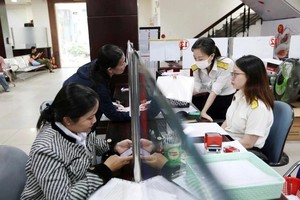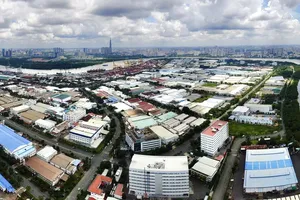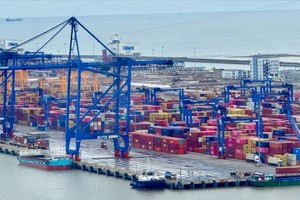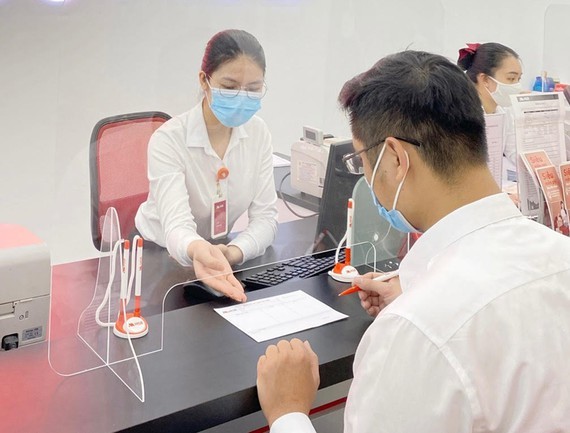 Commercial banks raise deposit interest rates, enterprises face difficulties. (Photo: SGGP)
Commercial banks raise deposit interest rates, enterprises face difficulties. (Photo: SGGP)
Increasing capital demand
Since the Lunar New Year, to mobilize idle money from people, many commercial banks have increased their savings interest rates by 0.2-0.8 percent per annum, mainly for terms over six months. This move aims to help commercial banks increase their lending capital during the Tet holiday, promote lending, and inject a large amount of capital into production and business activities. However, many commercial banks said that a large amount of bank deposits had flowed to other investment channels with better profitability, such as gold, securities, and real estate. It has forced commercial banks to stand in the middle to balance between increasing deposit interest rates to attract capital and keeping lending rates low enough to support businesses to overcome the pandemic.
In January 2022, credit growth surged by 2.74 percent compared to the end of 2021, showing a strong increase in capital demand right from the first month of the year. According to the market analysis department of SSI Securities Company, with the prospect that the economy will fully reopen in the coming period, credit demand will rise sharply. Moreover, inflation pressure is gradually strengthening, so deposit interest rates will probably start to inch up in the second half of 2022. As for State-owned commercial banks, including Agribank, BIDV, Vietinbank, and Vietcombank, savings interest rates will possibly edge up by 0.2-0.25 percent per annum compared to the current interest rate level.
Many stimulus packages
Despite the increase in deposit interest rates, many commercial banks said that the State has been stimulating credit demand, so banks still have preferential interest rate packages for individuals, as well as businesses to invest in production and business activities. However, if the State Bank of Vietnam (SBV) tights the monetary policy, lending interest rates will certainly be difficult to keep at the same level as in 2021.
Meanwhile, the SBV affirms that monetary policy aims at supporting businesses and prioritizing focusing on economic recovery sectors in 2022. Specifically, in 2022 and 2023, through the Socio-Economic Development and Recovery Program, there will be a budget package to support 2 percent of loan interest rates, worth about VND40 trillion through banks. Currently, the SBV has been drafting a decree guiding the implementation of this interest rate support package and consulting ministries, sectors, and businesses. The decree is expected to be issued in March 2022.
Specifically, the draft decree stipulates that the beneficiaries of the interest rate support package include enterprises, cooperatives, and business households in the following sectors: aviation, transport and warehousing; tourism; accommodation and catering services; education and training; agriculture, forestry, and fishery; manufacturing and processing; software publishing; computer programming and related activities; information service activities. Other cases are also supported, including the purposes of building houses for workers, building social housing, and renovating old apartment buildings on the list of projects announced by the Ministry of Construction. The support interest rate for customers is 2 percent per annum for loans disbursed from January 11, 2022, to the end of December 31, 2023.
To receive interest rate support through the Socio-Economic Development and Recovery Program, customers must have an application and be approved by the lending bank at the time of disbursement or the time of signing the loan agreement. Noticeably, the SBV's draft also sets out specific principles to prevent policy profiteering. Particularly, if the competent agencies and units conclude that the customer uses the loan for the wrong purpose, the customer is responsible for returning the amount of interest-supported money to the bank to repay the State budget. This regulation is assessed to avoid the case that enterprises use loans for other purposes, especially investing in non-priority fields, such as real estate and securities.
Since the Lunar New Year, to mobilize idle money from people, many commercial banks have increased their savings interest rates by 0.2-0.8 percent per annum, mainly for terms over six months. This move aims to help commercial banks increase their lending capital during the Tet holiday, promote lending, and inject a large amount of capital into production and business activities. However, many commercial banks said that a large amount of bank deposits had flowed to other investment channels with better profitability, such as gold, securities, and real estate. It has forced commercial banks to stand in the middle to balance between increasing deposit interest rates to attract capital and keeping lending rates low enough to support businesses to overcome the pandemic.
In January 2022, credit growth surged by 2.74 percent compared to the end of 2021, showing a strong increase in capital demand right from the first month of the year. According to the market analysis department of SSI Securities Company, with the prospect that the economy will fully reopen in the coming period, credit demand will rise sharply. Moreover, inflation pressure is gradually strengthening, so deposit interest rates will probably start to inch up in the second half of 2022. As for State-owned commercial banks, including Agribank, BIDV, Vietinbank, and Vietcombank, savings interest rates will possibly edge up by 0.2-0.25 percent per annum compared to the current interest rate level.
Many stimulus packages
Despite the increase in deposit interest rates, many commercial banks said that the State has been stimulating credit demand, so banks still have preferential interest rate packages for individuals, as well as businesses to invest in production and business activities. However, if the State Bank of Vietnam (SBV) tights the monetary policy, lending interest rates will certainly be difficult to keep at the same level as in 2021.
Meanwhile, the SBV affirms that monetary policy aims at supporting businesses and prioritizing focusing on economic recovery sectors in 2022. Specifically, in 2022 and 2023, through the Socio-Economic Development and Recovery Program, there will be a budget package to support 2 percent of loan interest rates, worth about VND40 trillion through banks. Currently, the SBV has been drafting a decree guiding the implementation of this interest rate support package and consulting ministries, sectors, and businesses. The decree is expected to be issued in March 2022.
Specifically, the draft decree stipulates that the beneficiaries of the interest rate support package include enterprises, cooperatives, and business households in the following sectors: aviation, transport and warehousing; tourism; accommodation and catering services; education and training; agriculture, forestry, and fishery; manufacturing and processing; software publishing; computer programming and related activities; information service activities. Other cases are also supported, including the purposes of building houses for workers, building social housing, and renovating old apartment buildings on the list of projects announced by the Ministry of Construction. The support interest rate for customers is 2 percent per annum for loans disbursed from January 11, 2022, to the end of December 31, 2023.
To receive interest rate support through the Socio-Economic Development and Recovery Program, customers must have an application and be approved by the lending bank at the time of disbursement or the time of signing the loan agreement. Noticeably, the SBV's draft also sets out specific principles to prevent policy profiteering. Particularly, if the competent agencies and units conclude that the customer uses the loan for the wrong purpose, the customer is responsible for returning the amount of interest-supported money to the bank to repay the State budget. This regulation is assessed to avoid the case that enterprises use loans for other purposes, especially investing in non-priority fields, such as real estate and securities.
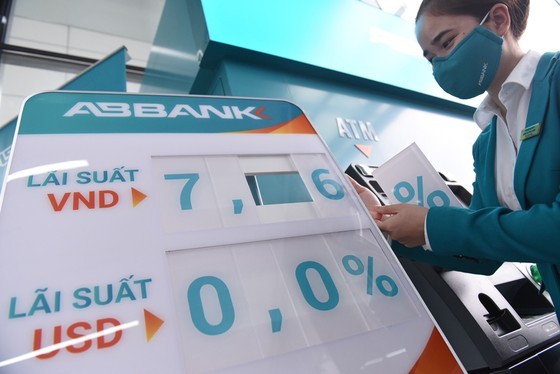 Banks raise deposit interest rates to attract capital and prepare to boost lending. (Photo: SGGP)
Banks raise deposit interest rates to attract capital and prepare to boost lending. (Photo: SGGP)
However, some people said that some commercial banks would neglect the support package due to low profits, the pressure from being inspected and having to report regularly to the relevant authorities, and the risk of not being settled. The leader of a commercial bank in Ho Chi Minh City said that the most worrying thing for commercial banks today is the settlement procedure for interest rate compensation. The draft decree stipulates that the Ministry of Finance will temporarily provide interest rate compensation to commercial banks quarterly, with the amount of temporary provision for interest rate compensation equal to 90 percent of the sum of money that commercial banks have provided interest rate support to customers in the quarter. “The provision level needs to be higher, at about 95 percent. In addition, the conditions and procedures for settlement must be more detailed and clear for banks to implement because there are many cases entitled to the interest rate support package from 2009, but up to now, many banks have not completed the settlement," he suggested. Meanwhile, according to a representative of the Vietnam Association of Small and Medium Enterprises, the biggest concern of enterprises is that they are not being eligible to access the above interest rate support package because commercial banks said that they would not lower the standard for this support package to ensure safety for them. Meanwhile, currently, up to 90 percent of enterprises are facing difficulties, and the health of many enterprises has been seriously affected or even exhausted due to the prolonged Covid-19 pandemic. As a result, tightening credit-granting conditions will make it very difficult for enterprises to access the support package.








